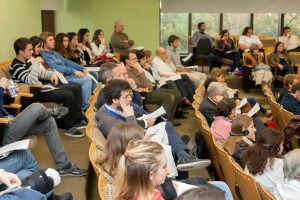
We received the visit of Eleonore Stump, Robert H. Henle professor of Philosophy at the University of Saint Louis (USA), where she teaches since 1992. Professor Stump has an extensive list of publications in the areas of Philosophy of Religion, Contemporary Metaphysics, and Medieval philosophy. She is a former President of the Society of Christian Philosophers, of the American Catholic Philosophical Association, and of the American Philosophical Association (Central Division); and is a member of the American Academy of Arts and Sciences. She has been a lecturer at the prestigious Gifford Lectures (Aberdeen, 2003), Wilde Lectures (Oxford, 2006), and Stewart Lectures (Princeton, 2009).
Professor Stump has participated in the closing meeting of the Cluster Group led by Dr. Mariano Asla and Dr. Omar Pivetta, “Human disgrace and divine grace in suffering”, which has worked on the issue of human suffering throughout the second semester of 2015. The group was funded by the project “Special Divine Action” of the Iam Ramsey Centre (University of Oxford), with support of the John Templeton Foundation. This meeting took place on May 23 and focused on a Thomist approach to the problem of human suffering.
On Tuesday May 24, Professor Stump delivered the open lecture “The Problem of Evil and the Desires of the Heart” at the School of Biomedical Sciences (Universidad Austral), which was attended by around 80 people. Among the attendants there were students and professors of Nursing, Medicine and Psychology at Universidad Austral, as well as researchers, philosophers and teachers from various educational institutions and staff of the Hospice “Buen Samaritano”.

On Thursday May 26, Eleonore Stump was in charge of the first session of the Seminar “Person, Mind & Brain”, of the Philosophy Institute, which will address scientific and philosophical perspectives, seeking to reach an interdisciplinary understanding of the human person. On this occasion Professor Stump lectured about “Mind-reading and empathy and the knowledge of persons”, addressing the issue of the ability to read the intentions of others and the role of mirror neurons, and how this ability is affected in people with autism
